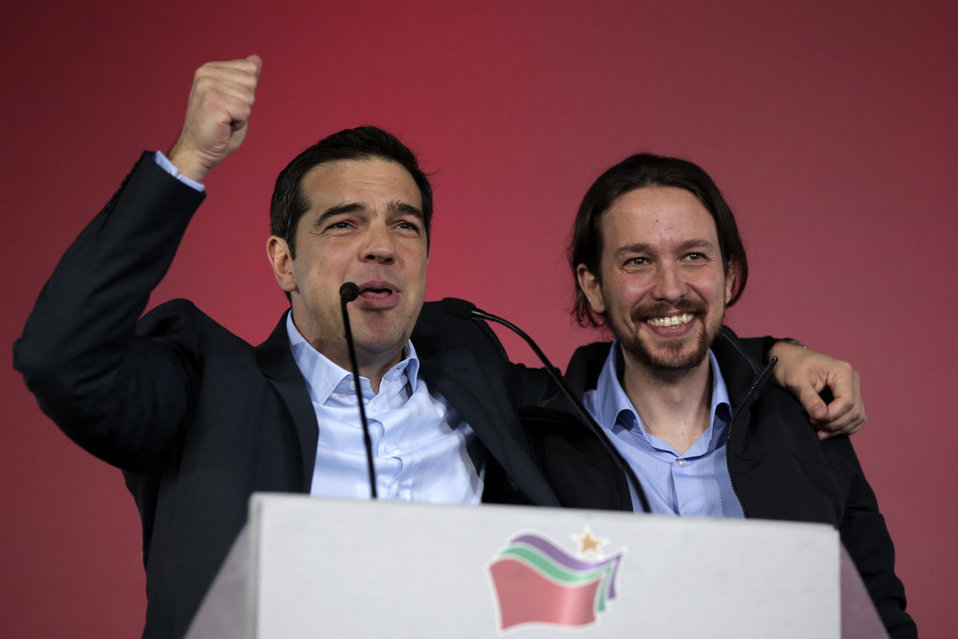Despite a growth in populism studies, overall, it has been suggested that gender has arguably been marginalised in this research.
As 2019 commences, it is indeed timely to reflect on the empirical and theoretical performativity of populism – that is bringing about ‘realities’ in the practice and study of European politics and the place of gender within this. Cas Mudde suggests that populism has indeed become the concept that ‘defines our age’ (Guardian, 22/11/18) and it has brought about several empirical and theoretical studies.
Genealogies of the concept trace its articulation in left movements in South America, as well as iterations in right movements and actors, such as Donald Trump. For some scholars, populism has gone global (Moffitt, 2016). The concept has become felicitous in the public and academic consciousness. Google trends shows peaks for the concept in worldwide search engines in 2016 and 2018. The renewed interest has coincided with trends such as migration, social inequality, disinformation, and the multifarious ways in which notions of ‘threats’ are amplified and disseminated across Europe (Kovala et al, 2018).
Despite a growth in populism studies, overall, it has been suggested that gender has arguably been marginalised in this research (Saresma, 2018). Studying populism in the institutional context of the European Parliament, we may probe further into other strands of populism studies into what the broader relationship of populism is with feminist politics. Populism involves making claims about ‘the people’. Simplification and polarisation may not be conducive with feminism. Populism may in fact be a ‘anathema’ to feminist intersectional and redistributive politics (Emejulu, 2017). With these challenges of populism in mind, we (EUGenDem) invited academics to the University of Tampere to discuss the relationship with feminism. On Thursday 13thDecember, scholars from the Universities of Tampere, Helsinki, Complutense de Madrid, and Jyväskylä came together to discuss the relationship between feminism and populism. These discussions were productive and were of relevance to previous activities within our EUGENDEM project.
Populism and institutions
Our EUGENDEM study into the operation of gender within the political groups in the European Parliament has started to engage with an institutional strand of populism studies. These studies asses the institutional dynamics and discursive struggles of populism within and across the political groupings. We are interested in the entanglements between populism and gender. A close look at the operation of populist discourses is important for debates over the potential for a revival of democracy as well as the rationalisation of the work of the European parliament. Our fortnightly reading group has explored some rich literature on populism, anti-system actors in the European Parliament, and the EU Parliament’s Rules of Procedure (Brack, 2017; Pallaver et al. 2017). Members of the EUGENDEM team also attended a BIBU talk by Nonna Mayer on October 5th 2018, on the growth of support for the radical right by women in France and thus a decreasing gender gap in France in support for the radical right.
The European Parliament
Arguably, populism is not ancillary but is at the very heart of the work within the European Parliament. In particular it is shaping a relational conception of discursive political space (Bates and Smith, 2008) – conceptualised as affective, embodied, physical, and textual. It is interesting to explore whether and how political groups and national delegations choose to present and absent themselves in discursive political space involving populism. They have responded to populist demands, meanings and acts in their political representation through strategies such as indifference, collaboration, and demarcation (Van Hecke and Andrione-Moylan, 2017). Indeed, the notion of a cordon sanitaire – that is, the vacuum surrounding populist parties to avoid publicising their claims, vividly encapsulates the notion of political space.
Examples of each political grouping establishing its own narrative and practices vis-à-vis populism include the European People’s Party EPP adopting, at its congress in Helsinki in November 2018, an emergency resolution in support for liberal principles such as academic freedom, media pluralism, and the rule of law. However, the choice of Manfred Weber, supported by Orbán, as the group’s Spitzenkandidat has casted some doubts about these commitments. Austria’s presidency of the European Council, also occasioned Udo Bullman to call for them to sign the UN Migration Pact. The ECR group also largely voted against Judith Sargentini’s report on the Situation in Hungary. Therefore we can see that populism is shaping several aspects of the discursive space of the European Parliament and its political groupings.
Seminar hosted by EUGENDEM at the University of Tampere on the 13th December 2018
Three distinct presentations were given at the inter-disciplinary seminar: by Emilia Palonen and Emanuela Lombardo and Johanna Kantola from political science backgrounds, and Saresma with a cultural studies background. The value of an inter-disciplinary seminar was that it allowed the phenomenon of populism to be engaged with in multiple lenses.
Emilia Palonen from the Mainstreaming Populism Consortium presented a conceptual paper. She has written on populism in Hungary, using Laclau’s notion of an empty signifier. She argues for greater conceptual precision as populism becomes more integrated into the popular and academic debate. She spoke about affects as ‘gripping’ affects, but also an emptying out of affect towards another, a weightlessness, dehumanisation, and emptiness. She posed ontological questions about what populism is and argues, like other scholars (Moffitt, 2016) that populism is gradational not binary.
Palonen urges scholars to look at entanglements with nationalism, anti-Semitism, racism, transnational misogyny, rather than conflating these concepts – and indeed, finding methods and analytical strategies to disentangle them. She presented a formula of populism, (1) abstract ‘we’, (2) a ‘them’ enemy, and (3) a gripping affect that informs (1) and (2). Like Mouffe (2018), Palonen argues that a degree of populism is necessary for democracy, but there needs to be a balance. She also suggests that populism can be observed more clearly in ‘populist moments’. She argues that the political utility of populism is that the core of populism need not be defined, since instead, enemies are constructed.
Emanuela Lombardo from Complutense de Madrid and Johanna Kantola from the University of Tampere’s paper looked at two cases of Finland and Spain, drawing on interviews and policy documents. They took a multi-dimensional approach, looking at political representation, (in)formal institutions, and spaces and asked more specifically what the relationship between populism and feminist politics is and how feminist politics is articulated in populist parties. Lombardo delivered the paper concentrating on Spain and Podemos (meaning “We Can”) – a party that was seen as an antidote to broken political regimes in Spain and Europe. They had emerged after 2008 and disrupted Spain’s two-party system. Podemos are based upon the intellectual authority and hierarchy of charismatic male political scientists as leaders. She detailed practices such as having ‘cervezas’ – that is, going for beers outside the formal working hours and are also cultivating a competitive ‘winning’ and confrontational atmosphere. This suggests that in anti-system parties can revert to traditional masculine tropes and practices. Indeed this is a pattern that has been observed in other left activist spaces (Emejulu, 2017; Dean and Maiguashca, 2018). Therefore, the practices of left populist parties and spaces warrant close attention. It problematises the notion of right-wing populism as exclusionary and left-wing populism as inclusionary.
Tuija Saresma from the University of Jyväskylä explored how gender is performed in populist rhetoric and introduced the concept of ‘gender populism’. Gender populism refers to: ‘a simplifying understanding of gender as a ‘natural’, essential dichotomous order, based on positioning men and women in hierarchical locations in terms of power’ (2018, p.177). Manifestations of this dichotomous order also are visible in the idea of ‘the people’ versus ‘the academic feminist elite’. Indeed affective appeals are important to mobilise support – why people become part of a ‘we’ matter. She discussed affects such as resentment at play in the manosphere. Therefore paying attention to affective knowledge is important. She drew on a rich affects theoretical framework featuring Ahmed, (2004) and Wodak (2015). Saresma shows empirically how performing gender is at the very core of the men’s rights movements where nostalgia, heteropatriarchy, and idealistic of heterosexual love are enacted.
Looking forward: Gender, populism and the political groupings of the European Parliament
There are further questions about populism in the specific context of our EUGENDEM project. The European Parliament may look significantly different after May 2019’s EU Parliamentary elections. How might populism inform strategies, narratives, and practices, and indeed the composition of the political groupings and the ‘grand coalition’ in general? What (feminist) claims and policies are put centre stage in this ‘fight’ and what policy work is conducted by individual MEPs with less backing from their grouping? Who are the ‘gendered actors working with the rules’ (Lowndes and Roberts, 2013) who are (not) recognised as strong agents of ‘leadership’ on European populism? Is there any potential for gender-positive populisms? What does this mean for democratic (re)invigoration? Is populism now the only game in town? Can the political groups, or ‘gendered actors working with the rules’ (Lowndes and Roberts, 2013) articulate a ‘we’ in their feminist politics and potentially build solidarity across intersecting power structures to integrate new demands and new meanings (Mouffe, 2018)? We look forward to paying close attention to these questions in 2019.
More information about our EUGENDEM project can be found here.
References
Ahmed, S. (2004): The Cultural Politics of Emotion, Edinburgh: Edinburgh University Press
Bates, S. and N. Smith (2008): ‘Understanding change in political science: On the need to bring space into theoretical positions and empirical analysis’, Political Studies Review, 6 (2), pp.191-204
Brack, N. (2017): Opposing Europe in the European Parliament: Rebels and Radicals in the chamber, Basingstoke: Palgrave Macmillan
Dean J, Maiguashca B. 2018. Gender, Power, and Left Politics: From Feminization to “Feministization”. Politics & Gender. 14(3), pp. 376-40
Emejulu, A. (2017): Feminism for the 99%, Soundings: A Journal of Politics and Culture, pp. 63-67
Lowndes, V. and Roberts M. (2013): Why institutions matter, Basingstoke: Palgrave MacMillan
Moffitt, B. (2016): The Global Rise of Populism: Performance, Political Style, and Representation, USA: Stanford University Press
Mouffe, C. (2018): For a left populism, London: Verso Books
Mudde, C. (2018): ‘How populism became the concept that defines our age’, Guardian, (22/11/18).
Kovala, U., Palonen, E., Ruotsalainen, M. and Saresma T. (2018): Populism on the Loose, Jyväskylä: Nykykulttuurin tutkimuskeskus
Pallaver, Günther, Gehler, Michael, & Cau, Maurizio. (2018): Populism, populists and the crisis of political parties. A comparison of Italy, Austria and Germany 1990-2015, Berlin: Duncker Humblot
Saresma, T. (2018): ‘Gender Populism, Three cases of Finns Party Actors’ Traditionalist anti-feminism’, in Kovala, U., Palonen, E., Ruotsalainen, M and T Saresma (2018): Populism on the Loose, Jyväskylä: Nykykulttuurin tutkimuskeskus pp.178 –
Van Hecke, S. and A. Andrione-Moylan (2017) ‘Between Collaboration and Demarcation: The EPP and the Populist Wave’, in Pallaver et al. (eds), Populism, populists and the crisis of political parties. A comparison of Italy, Austria and Germany 1990-2015, Berlin: Duncker Humblot, pp.239-259
Wodak, R. (2015): The Politics of Fear: What Right Wing Populist Discourses Mean, London: SAGE Publications







